
AAAP in the Media
Displaying 1 - 4 of 4
Global Leaders Rally Support and Finance for the Africa Adaptation Acceleration Program to Tackle Climate Change in Africa
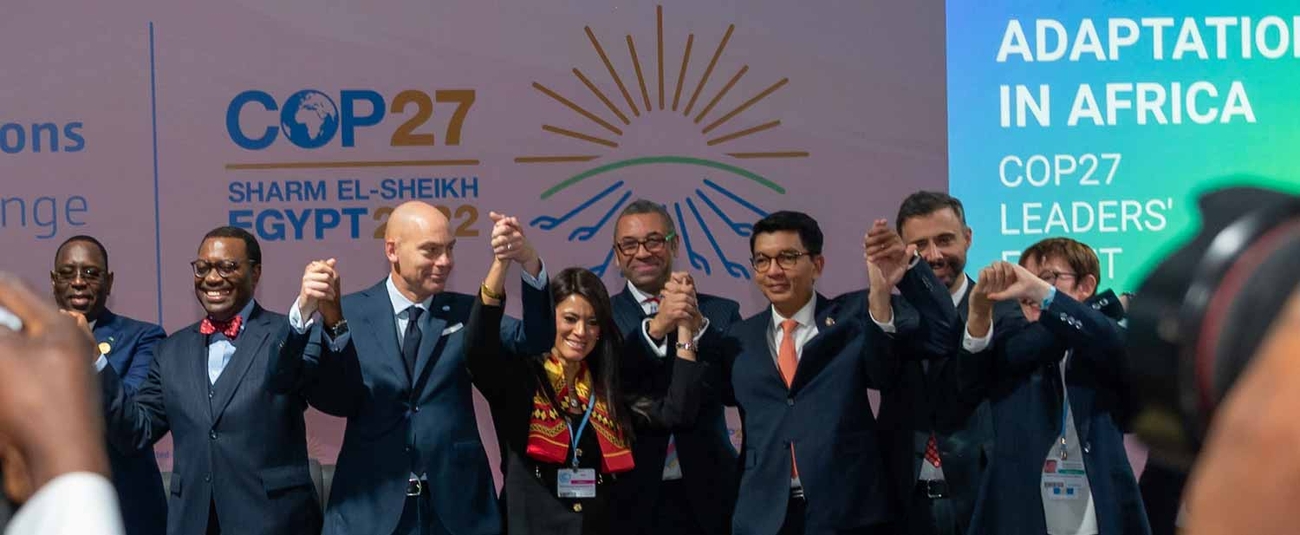
Global leaders on Tuesday rallied around climate adaptation for Africa. They attended the Africa Adaptation Leaders’ Event, convened by African Union Chair President Macky Sall of Senegal, Global Center on Adaptation CEO Patrick Verkooijen, and African Development Bank Group President Akinwumi Adesina.
The event took place at the global climate summit (COP27) in Sharm El-Sheikh, Egypt. It underscored the critical need for climate adaptation in Africa and responded to the call for the capitalization of the Africa Adaptation Acceleration Program (AAAP).
“This is a pivotal step in the fight against climate change,” African Union Chair President Macky Sall said. “The commitments made by Africa’s partners will give the Africa Adaptation Acceleration Program the boost that it needs to transform the development trajectory of the world’s most climate exposed continent. I am confident in the ability of the AAAP to deliver results for Africa.”
The Africa Adaptation Acceleration Program is an Africa-owned and Africa-led initiative developed by the Global Center on Adaptation (GCA) and the African Development Bank (AfDB) in close collaboration with the African Union. It serves as the implementation of the Africa Adaptation Initiative (AAI) to mobilize $25 billion to implement, scale and accelerate climate adaptation across the Africa. Since 2021, AAAP has mainstreamed climate adaptation in over$3.5 billion of investments in 19 countries.
United Nations Secretary-General António Guterres said: “I want to express my total solidarity for the Africa Adaptation Acceleration Program […] I urge the international community to support Africa to mobilize the technical & financial resources for scaling up transformative adaptation.”
“With this innovative program, Africa has developed a plan to grow, create jobs and opportunities for people, and to be resilient against the climate crisis,” said President Akufo-Addo of Ghana. “AAAP’s singular focus on the issue of climate adaptation will also contribute to greater stability and progress in Africa and around the world. AAAP is aligned with Ghana’s plans to address climate change as it chairs the Climate Vulnerability Forum (CVF) to lead efforts from the world’s most climate vulnerable countries to spur and mobilize investment through the Climate Prosperity Plans."
James Cleverly, Secretary of State for Foreign, Commonwealth and Development Affairs of the United Kingdom announced that the UK will provide £200 million to the African Development Bank’s Climate Action Window. This is in addition to the £20 million announced at COP26 in Glasgow to the AAAP Upstream Financing Facility.
Cleverly noted: “Climate change is having a devastating impact on countries in Sub-Saharan Africa facing drought and extreme weather patterns, which have historically received a tiny proportion of climate finance. This new mechanism […] will see vital funds delivered to those most affected by the impacts of climate change, much more quickly.”
Prime Minister Mark Rutte of the Netherlands followed through on the commitment made at the Africa Adaptation Summit held at the Global Center on Adaptation in September to confirm that the Netherlands will contribute EUR110 million to the AAAP, with EUR10 million in support for the Upstream Financing Facility hosted by GCA and EUR 100 million for the Climate Action Window of the African Development Fund at the African Development Bank as part of the Netherlands’ commitment to dedicate half of its climate funding, fully grant based, to climate adaptation, with a focus on Africa.
Norwegian Prime Minister Jonas Gahr Støre echoed African leaders’ calls for countries to rapidly scale up finance for climate adaptation, stating: “The climate crisis is here and now. Years of progress are at risk.”
“The AAAP Upstream Financing Facility is the delivery mechanism of adaptation and will use millions to leverage the billions that is required for adaptation,” he continued. “AAAP projects will generate effective climate adaptation outcomes. Adaptation is a growth agenda. A jobs agenda. And a prosperity agenda. On behalf of Norway, I am looking forward to continuing this partnership, investing in it, and supporting it with the Global Center on Adaptation.”
International Monetary Fund Managing Director Kristalina Georgieva emphasized the need to accelerate adaptation in Africa, stating: “It is paramount to support Africa’s adaptation because Africa will not reach its tremendous potential without it. AAAP complements the IMF’s Resilience and Sustainability Trust, which helps countries address external shocks such as climate change and ensure sustainable growth that can give Africa a chance to leapfrog outdated development models.”
African Development Bank Group President Dr. Akinwumi Adesina said: “Africa is suffering from the devastating effects of climate change. Our continent is being short changed by climate finance. The contributions towards the Africa Adaptation Acceleration Program’s Upstream Financing Facility and the Climate Action Window – which the African Development Bank manages – will help capitalize the program. With increased capital, we can better deliver the investment needed to bridge the adaptation finance gap. We want to ensure that the most vulnerable communities can benefit from a sustainable and prosperous future.”
Endorsing the outcomes of the high-level meeting, Patrick Verkooijen, CEO of the Global Center on Adaptation, closed with a statement emphasizing the AAAP’s impact to date, noting that “there is no pause button on the climate crisis. Africa must adapt to the threat of climate change, and it must adapt now.”
“Through the AAAP,” he continued, “Africa has charted its path towards a climate-resilient future for its youth, its economic growth, and for its prosperity.”
About the Global Center on Adaptation
The Global Center on Adaptation (GCA) is an international organization which works as a solutions broker to accelerate action and support for adaptation solutions, from the international to the local, in partnership with the public and private sector, to ensure we learn from each other and work together for a climate-resilient future. Founded in 2018, GCA is hosted by the Netherlands, working from its headquarters in Rotterdam with a knowledge and research hub based in Groningen. GCA has a worldwide network of regional offices in Abidjan, Côte d’Ivoire, Dhaka, Bangladesh and Beijing, China. Through this evolving network of offices and global and regional GCA teams, the organization engages in high-level policy activities, new research contributions, communications, and technical assistance to governments and the private sector.
About the African Development Bank
The African Development Bank Group is Africa’s premier development organization. Its overarching objective is to spur sustainable economic development and social progress in its regional member countries, thus contributing to poverty reduction across the continent.
The Bank Group achieves this objective by mobilizing and allocating resources for investment in African countries and providing policy advice and technical assistance to support development efforts.
In 2015, all multilateral development institutions agreed on the same set of objectives, the United Nations Sustainable Development Goals.
Learn more: https://www.afdb.org/
About the Africa Adaptation Acceleration Program
The Africa Adaptation Acceleration Program (AAAP) is a joint initiative of the African Development Bank and the Global Center on Adaptation (GCA). It aims to mobilize $25 billion, over five years, to accelerate and scale climate adaptation action across the continent. This ambition is delivered through the AAAP Upstream Financing Facility managed by the Global Center on Adaptation and the African Development Bank’s climate action window in the ADF replenishment. AAAP works across four pillars to achieve transformational results: Climate-Smart Digital Technologies for Agriculture and Food Security; African Infrastructure Resilience Accelerator; Youth Empowerment for Entrepreneurship and Job Creation in Climate Adaptation and Resilience and Innovative Financial Initiatives for Africa. AAAP has already guided over $3.5 billion of upstream investments in 19 countries with every dollar spent influencing $100 downstream.
COP27 - COP27 Leaders' Event, Accelerating Adaptation in Africa (DAY 2)
UK steps up climate adaptation finance support for Africa
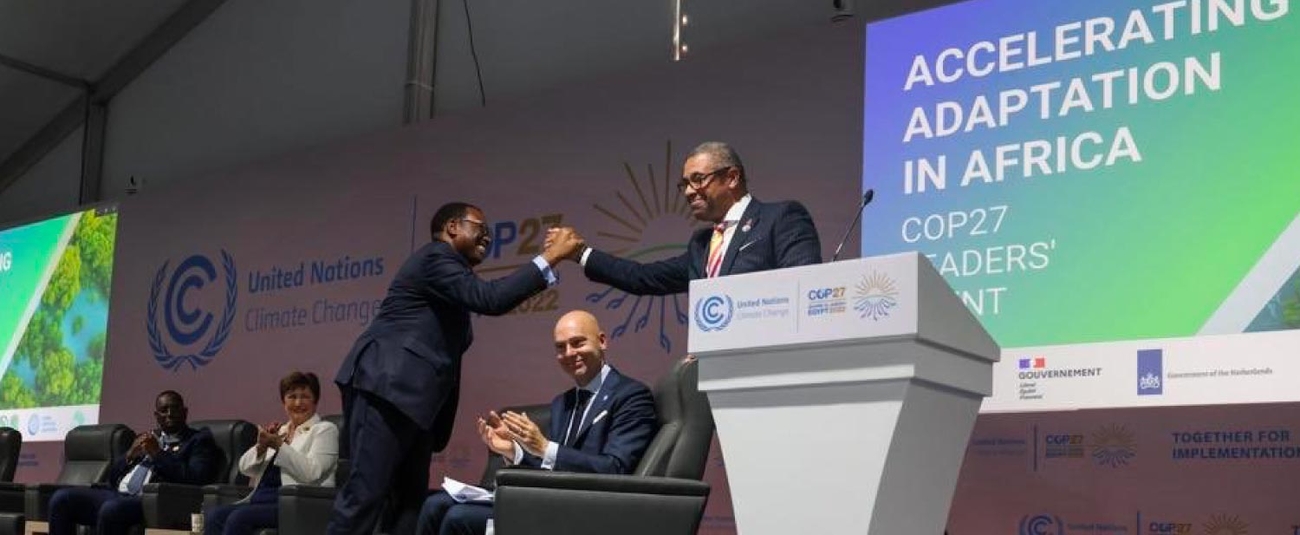
The United Kingdom has announced a significant increase in its financial support to the poorest African countries that bear the brunt of climate change.
Speaking alongside African leaders at COP27 in the Egyptian city of Sharm El Sheikh, British Foreign Secretary James Cleverly confirmed the UK will provide £200 million to the African Development Bank Group’s Climate Action Window, a new mechanism set up to channel climate finance to help vulnerable countries adapt to the impacts of climate change.
A number of countries on the continent have experienced extreme weather conditions from severe drought in Somalia to floods in South Sudan.
Foreign Secretary James Cleverly said: “Climate change is having a devastating impact on some of the poorest countries in Sub-Saharan Africa but historically they have received a tiny proportion of climate finance,” said Cleverly adding, “This new mechanism from the African Development Bank will see vital funds delivered to those most affected by the impacts of climate change, much more quickly.”
The UK Foreign Secretary noted, “Access to climate finance for emerging economies was a central focus at COP26 in Glasgow and I’m pleased to see tangible progress being made, supported today by £200 million of UK funding.”
Climate change has a disproportionate impact on the 37 poorest and least creditworthy countries in Africa. Nine out of ten most vulnerable countries to climate change are in Africa.
The Glasgow Climate Pact included a commitment from donors to double adaptation finance between 2019 and 2025.
Prime Minister Rishi Sunak announced at the weekend that the UK will surpass that target and triple adaptation funding from £500 million in 2019 to £1.5 billion by 2025. This funding package provided to the African Development Bank will be 100% preferenced for adaptation.
The Prime Minister also confirmed yesterday that the UK is delivering on the target of spending £11.6 bn on International Climate Finance (ICF) between 2021/22 and 2025/26.
The President of the African Development Bank Group, Akinwumi Adesina welcomed the additional funding from the United Kingdom and said,
“I applaud the UK government for this major contribution towards the capitalization of the Climate Action Window of the African Development Fund, as it seeks to raise more financing to support vulnerable low-income African countries that are most affected by climate change. This bold move and support of the UK will strengthen our collective efforts to build climate resilience for African countries. With increasing frequencies of droughts, floods and cyclones that are devastating economies, the UK support for climate adaptation is timely, needed, and inspiring in closing the climate adaptation financing gap for Africa.”
“I came to COP 27 in Egypt with challenges of climate adaptation for Africa topmost on my mind. The support of the UK has given hope. I encourage others to follow this leadership on climate adaptation shown by the UK”, said Adesina.
Can today’s Adaptation Action minimize future losses and damages in Africa?
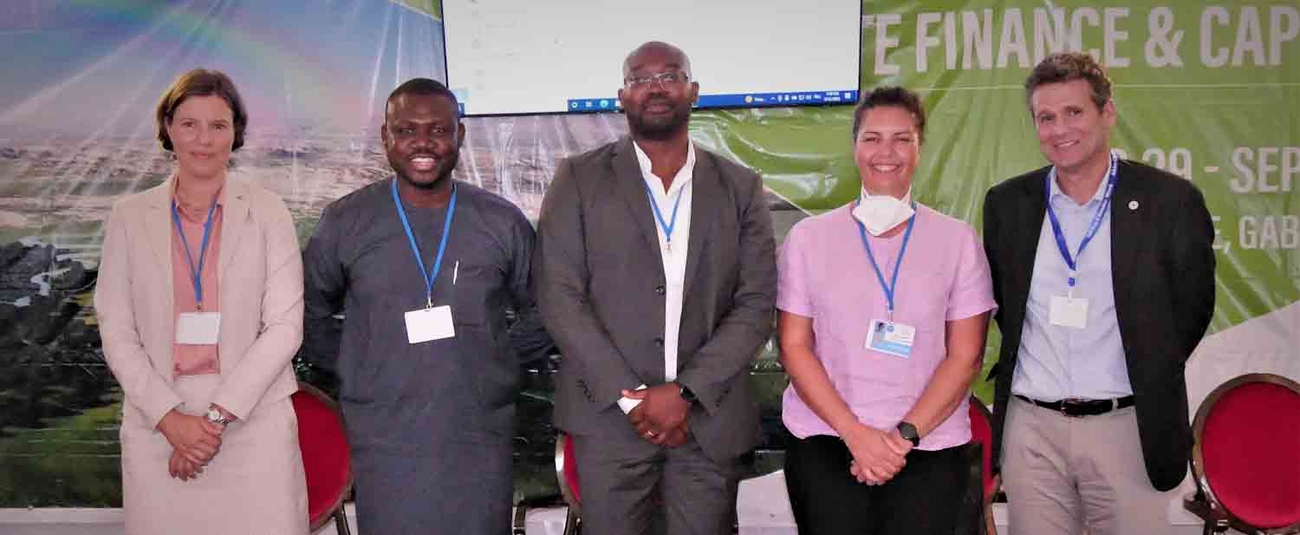
On the sidelines of the 2022 edition of Africa Climate Week(link is external), a session titled Limiting Loss and Damage through Enhanced Adaptation Action in Africa featured vibrant and timely discussion of an aspect of climate change that typically receives little attention: capturing and assessing the costs and damages associated with climate change.
The African Development Bank and Germany’s Konrad Adenauer Foundation hosted the event, which provided a forum for panelists and participants to discuss the importance of defining and evaluating such losses and damages of properties, economies, lives and livelihoods due to climate disasters. Africa is acknowledged to be the continent most vulnerable to climate change.
Moderator Olufunso Somorin, a Regional Principal Officer at the African Development Bank, opened the discussion. He pointed out that it is important for African countries to measure climate-change related loss and damage to enable appropriate quantification and well-designed responses best suited to country context. It was also important to capture those losses occurred even in instances where preventive climate adaptation actions had been taken, he added.
Fatten Agad, Africa Climate Foundation’s Senior Advisor on Climate Diplomacy and Geopolitics, called for production of a report that would serve as guidance and baseline for evaluating climate related losses and damage. “It has already been demonstrated that the socio-economic impact faced by African countries in coping with the Covid-19 crisis has been very high, and adding a burden of financing something such as loss and damage would be unfair,” she said.
Anja Beretta, Konrad Adenauer’s Director for Energy Security and Climate Change in Africa, urged African countries to integrate mechanisms to address losses and damage into their Nationally Determined Contributions (NDCs). She also called for designated institutions and functioning structures to ensure the efficient and effective use of climate finance to advance the discussion on financial flows into loss and damage.
Stephane Bonamy, Head of the Regional Delegation for the International Committee of the Red Cross in Cameroon, said, for countries that face both conflict and climate change impacts, it is imperative that preventive measures are put in place early enough to reduce the extent of loss and damage faced and lessen the burden on communities.” He noted that 14 of the 25 most vulnerable countries to climate change impacts worldwide also face some form of conflict.
Dr Olumide Abimbola, the Executive Director of the Africa Policy Research Institute in Berlin reiterated the need for more African examples of past and current loss and damage to be incorporated into textbooks and journals.
There was agreement among the participants on the need for Africa to prioritize timely, comprehensive and large-scale adaptation action to avert or minimize future losses and damages.
There was also consensus on the urgent need to scale up financial flows from public and private sources into adaptation action across Africa. They cited the African Development Bank’s Africa Adaptation Acceleration Program, a joint initiative with the Global Center on Adaptation, as a positive example. The program seeks to mobilize $25 billion over five years to accelerate and scale climate adaptation actions across the continent.
Participants also called for new strategic partnerships to drive adaptation policies, plans and investments in Africa through the implementation of NDCs and tapping synergies with such initiatives as the Africa Disaster Risk Financing program.
About the African Climate Week (ACW)
ACW is an annual event that engages and empowers stakeholders to drive climate action across countries, communities and economies. The event is organized by UN Climate Change in collaboration with global partners UN Development Programme, UN Environment Programme and the World Bank Group. Partners in the region include the Africa Union, the Africa Development Bank, the UN Economic Commission for Africa (UNECA). ACW 2022 was hosted in Gabon.
AAAP at COP27
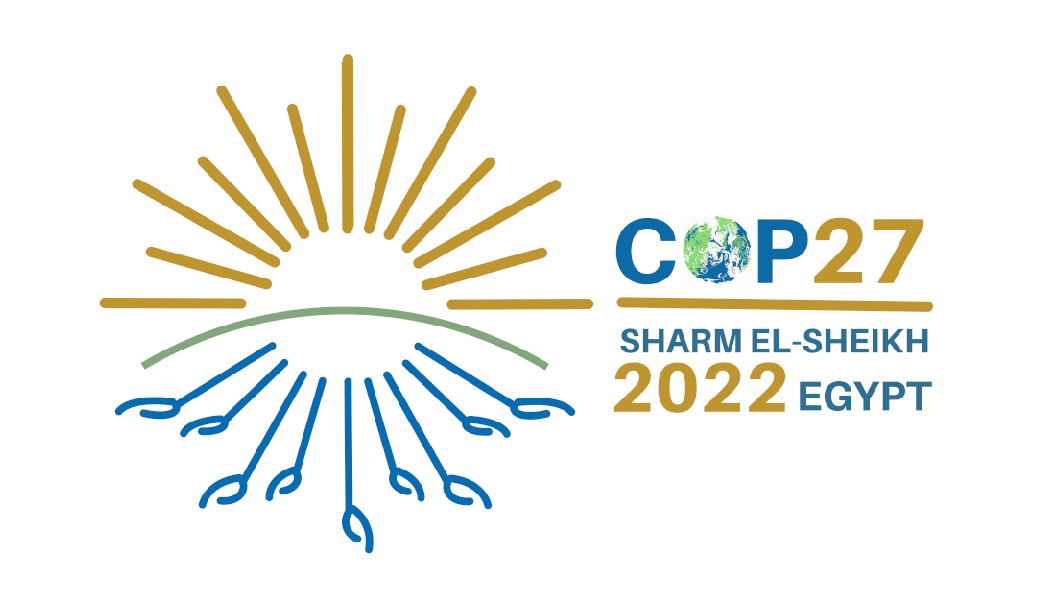
With the strapline, ‘Together for implementation,’ COP27 - the African COP, closed with a breakthrough agreement to provide “loss and damage” funding for vulnerable countries hit hard by climate disasters.
Here is a comprehensive look at AAAP’s focus on delivering an accelerated adaptation action in Sharm El-Sheikh.
Global Leaders Rally Support and Finance for the Africa Adaptation Acceleration Program to Tackle Climate Change in Africa
Global leaders rallied around climate adaptation for Africa. They attended the Africa Adaptation Leaders’ Event, convened by African Union Chair President Macky Sall of Senegal, Global Center on Adaptation CEO Patrick Verkooijen, and African Development Bank Group President Akinwumi Adesina.
The summit underscored the critical need for climate adaptation in Africa and responded to the call for the capitalization of the Africa Adaptation Acceleration Program (AAAP).
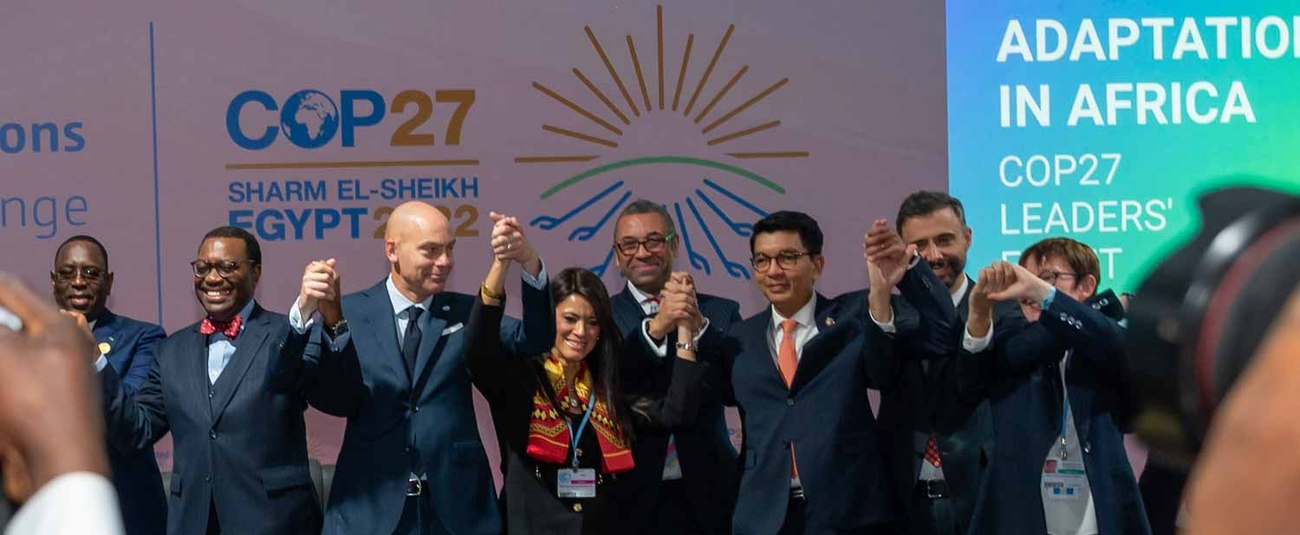
African Union welcomes the Netherlands’ contribution of EUR 110 million for the Africa Adaptation Acceleration Program at COP27
The African Union (AU) welcomed the Netherlands’ contribution of EUR 110 million in support of the Africa Adaptation Acceleration Program (AAAP) ahead of the COP27 Leaders’ Event on Accelerating Adaptation in Africa. The Prime Minister of the Netherlands Mark Rutte announced the financial commitment during a high-level meeting with Senegal’s President Macky Sallwho is also the Chairperson of the African Union, Patrick Verkooijen, CEO of the Global Center on Adaptation, and the President of the African Development Bank Group Dr Akinwumi A. Adesina.
Awards for Innovative Adaptation Solutions
On the sidelines of the 27th United Nations Climate Change Conference of Parties (COP27), which closed on 18 November 2022 in Egypt, the African Adaptation Acceleration Program unveiled the winners of the 2022 YouthADAPT challenge. For this second edition, 20 projects with USD 100,000 each for their climate innovations, particularly in the fields of agriculture, energy, and waste.
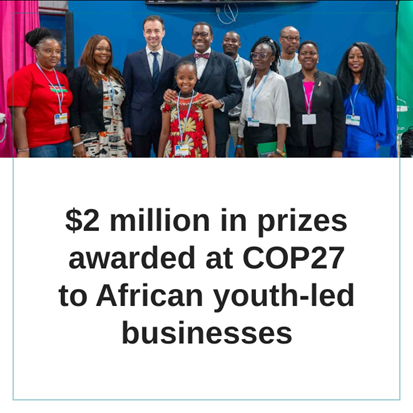
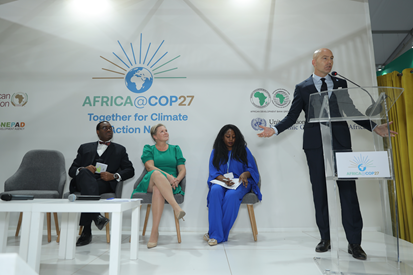
Showcasing Innovative Adaptation Solutions (2021 YouthADAPT Winners)
The winners of the 2021 YouthADAPT awards showcased their adaptation innovations at the Youth Pavilion. Three of the 15 winners demonstrated how additional funds from the YouthADAPT program had supported the growth of their businesses scaled-up business solutions and positioned these enterprises to better access further financing to support their growth.

Climate-proof Infrastructure solutions for low-carbon and resilient development in Africa
At the AAAP COP27 event on climate-resilient infrastructure, the Swiss Confederation through the Swiss State Secretariat for Economic Affairs (SECO) and Spain announced additional financial support to the African Development Bank Group’s Urban and Municipal Development Fund (UMDF), a thematic trust fund that helps African vulnerable countries to spur equitable green and climate resilient urbanization.
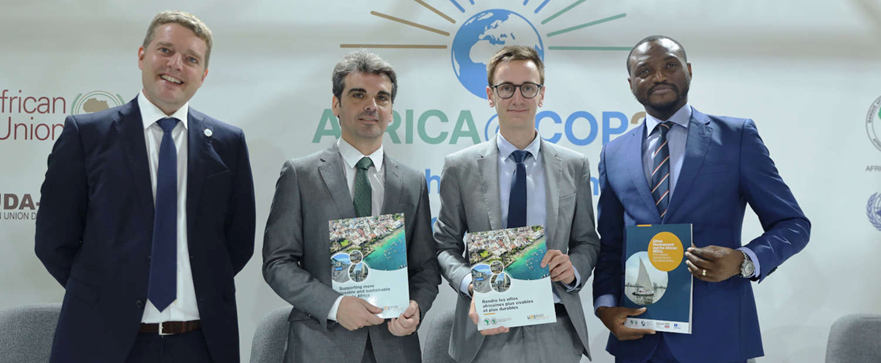
Le Programme sur l'accélération de l'adaptation en Afrique (AAAP). Opportunités pour l'Afrique francophone.
Passer en revue les exemples et les résultats des activités opérationnelles de la Facilité de financement en amont du PAAA, Mettre en évidence la façon dont le Programme d'accélération de l'adaptation en Afrique produit un triple dividende, en évitant les pertes futures, en stimulant les gains économiques et en offrant des avantages environnementaux et sociaux grâce aux investissements dans l'adaptation.
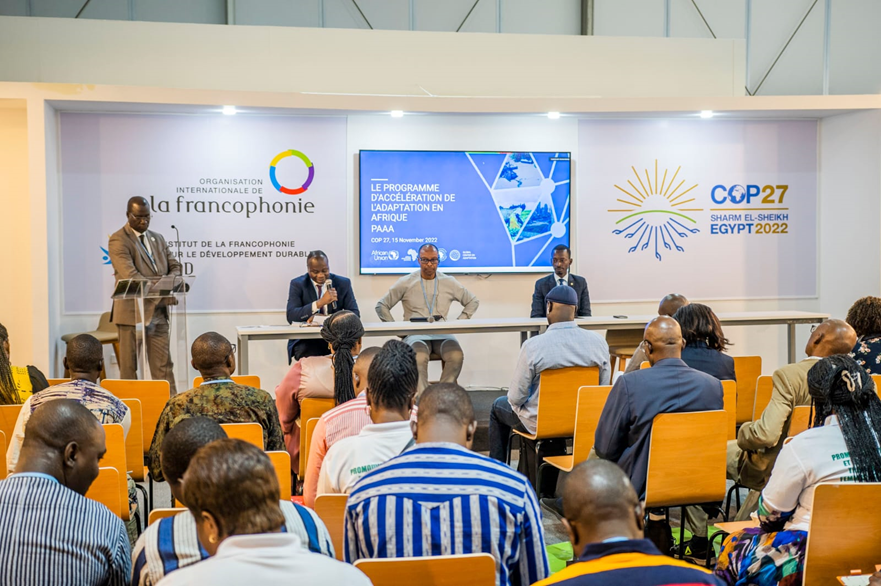
Mobilizing innovative Financing for building resilient and sustainable food system for Africa
African agriculture ministers attending the United Nations climate summit in Egypt reiterated a commitment to work with development partners to unlock the continent’s agriculture potential. During the special ministerial session, there was a strong consensus that Africa can feed itself if supported with green financing and climate-smart technology to boost agriculture productivity.
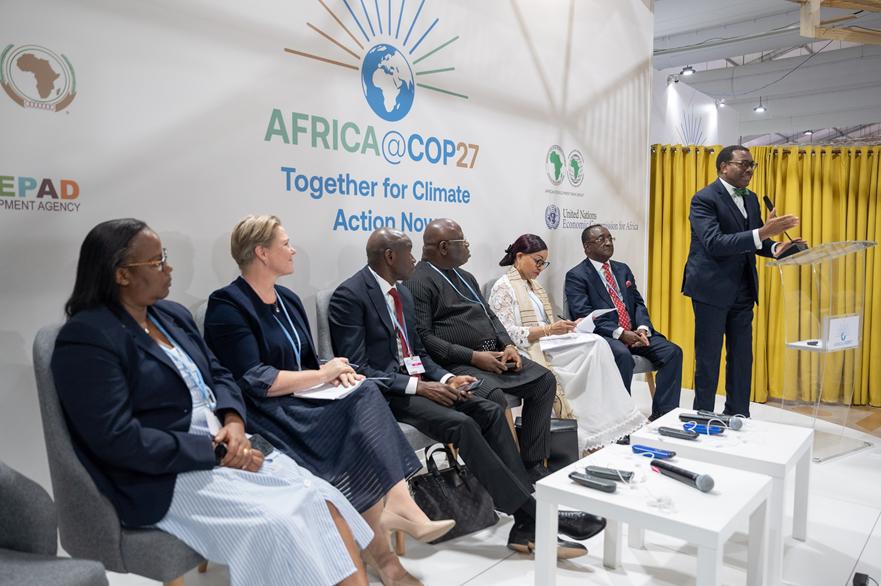
Bridging the adaptation finance gap - Innovative financing mechanism to attract the private sector
In the face of the climate crisis, Africa does not have the resources to tackle climate change. The continent receives only 3% of global climate financing. If this trend continues, Africa’s climate financing gap will reach $100 billion to $127 billion per year through 2030. How do we bridge the adaptation gap? AAAP organized a side event at the MDB Pavilion to discuss innovative instruments, tools, and approaches for climate finance.
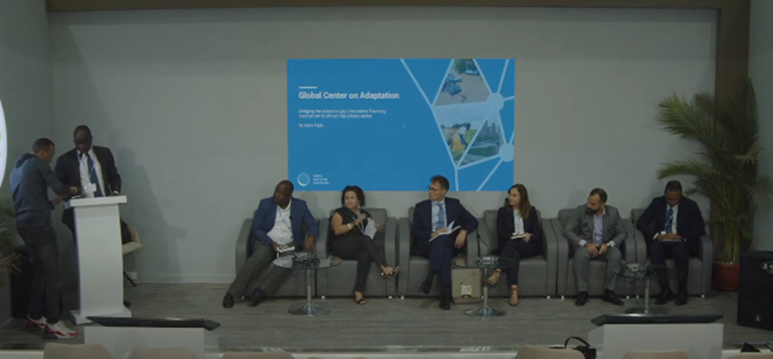
More AAAP COP27 related news
